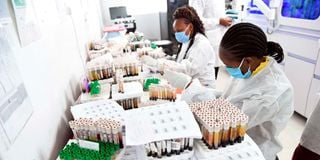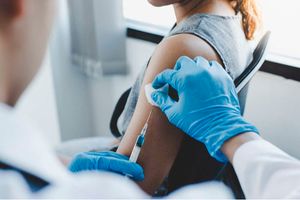Clinical trial approvals headache for Kenyan researchers

Laboratory technologists working on HIV sample tests at Kenya Medical Research Institute on April 7, 2020.
What you need to know:
- The lost clinical trials included tests on an antibiotic drug and a Covid-19 vaccine on children that were to be carried out by Walter Jaoko, professor of Medical Microbiology and Tropical Medicine and director of KAVI Institute of Clinical Research, University of Nairobi.
- The second one was a drug trial. We were testing an antibiotic. The two studies would have brought in about Sh50 billion.
Researchers have lost more than Sh180 million this year in over eight clinical trials due to slow approval processes and duplication of roles by various organisations.
Two clinical trials worth Sh28 million have also been withdrawn. But 36 trials were approved and are ongoing at various clinical sites in the country, according to the Pharmacy and Poisons Board (PPB).
However, according to the scientists, the number could be higher than what is being reported since they have made several applications that never go beyond the approval stage, denying Kenya an opportunity to make drugs for its citizens.
The World Health Organization defines clinical trials as research that studies new tests and treatments and evaluates their effects on human health outcomes. People may volunteer to take part in them to test medical interventions including drugs, cells and other biological products, surgical procedures, radiological procedures, devices, behavioural treatments and preventive care.
During a meeting with representatives from Research Ethics Committees,PPB, the National Commission for Science, Technology and Innovation (Nacosti), the Kenya Revenue Authority, the Clinical Research Society of Kenya and Clinical Research Organisations, six researchers lamented how their trials delayed despite follow-up due to a slow approval process.
The lost clinical trials included tests on an antibiotic drug and a Covid-19 vaccine on children that were to be carried out by Walter Jaoko, professor of Medical Microbiology and Tropical Medicine and director of KAVI Institute of Clinical Research, University of Nairobi.
“At the beginning of this year, we were to test the vaccine in young children. The jabs had already been approved in the West and they are being used to vaccinate their children. We wanted to determine whether children from an African population would respond the same way the other children from the West would. The second one was a drug trial. We were testing an antibiotic. The two studies would have brought in about Sh50 billion ,” says the researcher.
Prof Jaoko explains that a clinical trial is either investigator-initiated or sponsor-initiated. An investigator-initiated is one where an investigator writes a proposal to test a drug, vaccine or medical procedure.
But because research in Kenya is underfunded, most tests are sponsor-initiated. In this case, companies or non-profit institutions initiate clinical trials and fund them. Depending on the number of people they would like to recruit to participate, these institutions will approach countries to find sites (research centres) for conducting trials. The sites may be located in different areas.
A site is then selected, screened and vetted depending on many factors including whether it has done a clinical trial before that is similar to what the researchers want to pursue. Once a site is chosen, the researcher involved writes a study protocol detailing what they will do. This protocol goes through several approval processes before the recruitment of participants begins.
Prof Jaoko explains that mostly a researcher loses a clinical trial when they submit their protocols for approval. Still, the approval process and recruitment of participants take a long time, prompting the sponsor to drop a site and proceed with other centres to conduct the study. In other cases, the protocol may have been approved pending recruitment of participants, but based on a country’s approval period, the sponsor foresees more delay compared to other centres and therefore decides to proceed with others whose recruitment will take a shorter period.
“For instance, a sponsor has said that the University of Nairobi will be part of the many centres conducting a study and they need 10,000 participants. A researcher will submit the protocol to various institutions for approval. However, as they wait, the other centres based in other countries have already gotten approval and have started recruiting participants. By the time you are getting your approval, the 10,000 participants have already been recruited. So you lose the trial,” explains Prof Jaoko.
“In other instances, you may be part of 1,000 sites that are yet to begin recruiting participants. Having compared your approval periods with other countries and sites, they will tell you, “your approval processes will take us so long to wait for you, so we will proceed without you,’,” he adds. He explains that the delay is normally occasioned by the number of processes a protocol must go through before a researcher obtains approval. In the first step, a researcher submits their protocol to a research ethics committee. The committee reviews it and then forwards it to PPB, where another committee reviews it.
After that, it goes to the National Commission for Science and Technology (to obtain a research permit)then on to the county in which the research will be conducted for another review.
“At each of those stages, there is a delay somewhere. Once you get the approval, you must import the product that you are going to test — drug or vaccine. Then there are delays caused by the Kenya Revenue Authority , which sometimes thinks we are importing the products to sell and make profit,” says Prof Jaoko.
“When we bring a vaccine, it is for testing. Nobody will sell it anywhere because we don’t know whether it works. When they delay importing the product, other countries with an easy way of bringing it move their studies faster. Here (in Kenya), you may have received approvals faster but you do not yet have the product
“It takes an average of 180 days, about six months, to approve a clinical trial in Kenya. Some may take longer or shorter periods,” he adds.
Due to these delays, he explains that most sponsors prefer to go to Rwanda, which shortened the approval period to 60 days from 180. Rwanda, says Prof Jaoko, does parallel submissions, where researchers submit their protocols to relevant institutions so that they are reviewed concurrently instead of sequentially.
“We cannot compete. If there is a study to be done, the sponsors will go to Rwanda because the approval process there is shorter. The emphasis is to make the process efficient so that we become a part of a global community. When you are part of a global community, a lot of research will benefit you or your community. But there is a place for doing research that benefits humanity, even if it won’t benefit you. We benefit from people participating in research that is not affecting them,” explains Prof Jaoko. “The malaria vaccine was developed and tested for safety in animals and once it was found to be safe, it was tested on human beings. But those studies were done in the West. It wasn’t their problem, but they contributed their scientific knowledge to help humanity. Research may not benefit us directly, but it would benefit humanity,” he says.
The country, he says, is also disadvantaged since Kenyan researchers get limited to no funding from the government. The National Research Fund, which facilitates research on advancing science, technology and innovation, has limited resources.
“If we were to add all the clinical trials that all the sites do in a year, it would cost the government about Sh20 billion. Where would it get that money from? The fund also supports agriculture, veterinary, health and education. There are many competing priorities. All the research is allocated Sh1.5 billion yet health research needs about Sh30 billion. So we will always rely on external funding,” explains Prof Jaoko.
“What we miss from lost trials is the value of knowing that your people participated. We also cut a lot in terms of capacity building as sponsors usually equip the labs and train people to be involved in the research. People also lose jobs. When clinical trial funding comes, we recruit nurses, laboratory officers, doctors, procurement officials among others.
When you lose a study, you don’t employ,” he says.
“When you bring money through a study into the country, you buy stationery, computers, project vehicles, fuel and other items that ensure other people also benefit,” adds the researcher. Prof Jaoko states that the ethical review stage in Kenya is crucial in clinical trials. After this stage, the approval process will be expedited to ensure that research capacity is built effectively.
However, according to Dr Fred Siyoi, chief executive officer of the Pharmacy and Poisons Board, the delay at times is caused by duplication of efforts by various stakeholders who have to go through the proposals before they are approved. He adds that the Board takes at least 30 days maximum for the technical committee to approve a proposal.
According to Dr Siyoi, screening of the application, which is done at the portal, is done within five days; review of the application and details assessment takes another 30 days, with the final decision being made within 15 days of satisfactory review.
“The Board receives and processes applications for clinical trials once they have received a favourable opinion from a Nacosti accredited ethics committee. At the PPB, the first step is the pre-submission meeting, which is optional and can only be done on request from the researcher.” Next is receipt of the application and documents on the portal. Screening happens within five days. Should there be a need for additional information or documents, then the researcher is asked to do so. For another 30 days, the Board will allocate and evaluate the papers before the final decision is reached. If rejected, the Board communicates to the applicants and if awarded, the approval letter is issued.
The Board is left with the mandate of monitoring the study. Dr Siyoi indicates that apart from duplicates that may cause delays in approval, the applicants are to blame because they delay responding when asked for additional information or documents.
“When they take time to respond, they delay feedback from our end. Then there is the issue of financial constraints. When fees charged for clinical trial applications are not adequate for the approval and monitoring of trials and when the trial lacks human resource, we may require an additional human resource to do the work,” Dr Siyoi says.
He notes that sometimes the researchers cannot demonstrate that the study will cause minimal harm to the participants and the sponsors cannot provide evidence of how they will recruit the intended participants. This can lead to the discontinuation of the study.
For Nacosti, it is more of an ethical review to ensure that every guideline is followed since it involves human lives.
“Mostly, it reviews the questions that the participants are going to be asked to ensure that they are within their culture and that they give consent for their details to be used in the study and also the participants are at liberty of withdrawing from the trial whenever they so wish,” states Nacosti protocols. So far, Nacosti has accredited over 30 institutions to review the ethics of clinical trial proposals and they charge as per the proposal being reviewed. For students, the review is done for free.
Dr Bernard Langat, acting head of the Directorate of Digital Health Policy and Research at the Ministry of Health, acknowledges that there are delays in approvals, but he does not give the reasons, suggesting that stakeholders should work on parallel submission.
“The ministry will convene a meeting with the regulators (Ministry of Health, Nacosti, PPB and research ethics committees) and researchers to agree on how the parallel submissions will be made to address the foreseen challenges,” Dr Langat says.
He adds that there is a need to present a business case of clinical trials to show the amount of money that the trials would pump into the local economy.
He says Nacosti and PPB are looking for a single platform where all the applications can be placed and reviewed simultaneously.
“This will help minimise the time for approval and get to know the status of an application such that when one is rejected, then it seen by everybody and the applicants would not have to run it through another body for approval,” Dr Siyoi says.
He adds: “We have a mechanism in place for parallel submission of Covid-19-related trials. The same can be considered for other clinical trials. Researchers, however, need to ensure that the quality of submissions is ethically sound since the final decision will only be provided upon receipt of a favourable opinion from ethics committees.”






